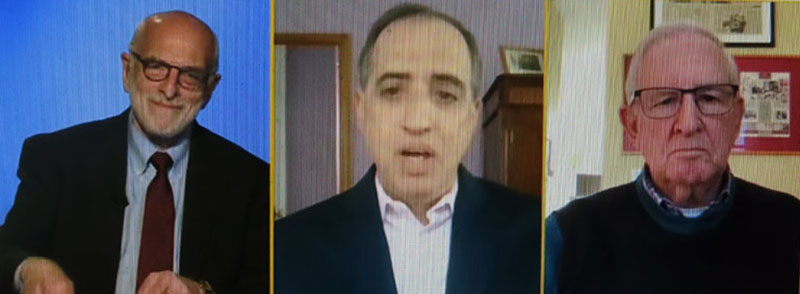Then and now -- a big difference in D.C. baseball, say veteran observers

Former Club President Michael Freedman, left, author Fred Frommer, center, and former announcer Phil Hochberg contrasted D.C. baseball past and present April 1. Photo: Joe Luchok.
Still giddy over the Washington Nationals’ World Series championship 17 months ago, baseball fans in the Nation’s Capital were disappointed by the April 1 announcement that the team’s much-anticipated 2021 opening game was postponed because of the coronavirus.
In the past, though, the disappointment might not have been as pronounced.
For nearly a century, baseball in D.C. was either abysmal or non-existent, and generated little enthusiasm, said baseball author Fred Frommer and former Washington Senators announcer Phil Hochberg at a virtual National Press Club Headliners event April 1.
In conversation with former Club President Michael Freedman, Frommer and Hochberg reviewed the dreary history of three major league franchises in the city between 1924, when the Washington Senators won the World Series behind legendary pitcher Walter Johnson, and the 2019 Nationals.
After 1924, the Senators were generally so inept that the city of Washington was jokingly derided as “first in war, first in peace, last in the American League,” said Frommer, author of “You Gotta Have Heart: Washington Baseball from Walter Johnson to the 2019 World Series Champion Nationals” and head of sports public relations at the Dewey Square Group.
Finally, in 1961 the team moved to Minneapolis, and was renamed the Minnesota Twins. The "new" Senators that replaced them in Washington were just as bad, before relocating in 1971 to Texas as the Rangers.
Then, for another 33 years, Washington had no major league team at all until the lowly Montreal Expos franchise came to town and became the Nationals in 2005.
“I would argue that no fans had it worse than Washington baseball fans,” said Frommer of the decades of frustration. Although the Chicago Cubs experienced an even longer drought between championships, he said, Washington “went 33 years with no team … and even when we did have a team, we were so bad for so long “
When the second Senators’ franchise skipped town in 1971, “I felt powerless -- having something taken away from me that I could do nothing about,” recalled Hochberg, who announced Senators’ games in the 1960s (andWashington's Football Team games even longer). “We went through it twice,” he said of losing teams to other cities. “Rooting for Washington baseball was difficult.”
Both speakers described the difference between fan enthusiasm in the days of the old Senators and today’s Nats. The contrast, said Frommer “is night and day.”
At a Senators game, noted Hochberg, if attendance reached 10,000 “it was a good night.” At Nats games, sell-out crowds of more than 41,000 were routine before coronavirus restrictions barred attendance during last year’s shortened season.
Frommer and Hochberg focused on baseball’s history in Washington. But in answer to questions on present-day issues, they agreed that baseball needs to shorten the length of games and increase action – experiments which are underway in the minor leagues. They disagreed, however, on whether Curt Flood, a 1960s player who led the movement toward free agency in the game, should be admitted to baseball’s Hall of Fame; Frommer said “absolutely,” Hochberg had “reservations.”
Neither saw an easy solution to the years-long, complex dispute between the Nationals and the Baltimore Orioles over television rights fees in the Baltimore-Washington area.
